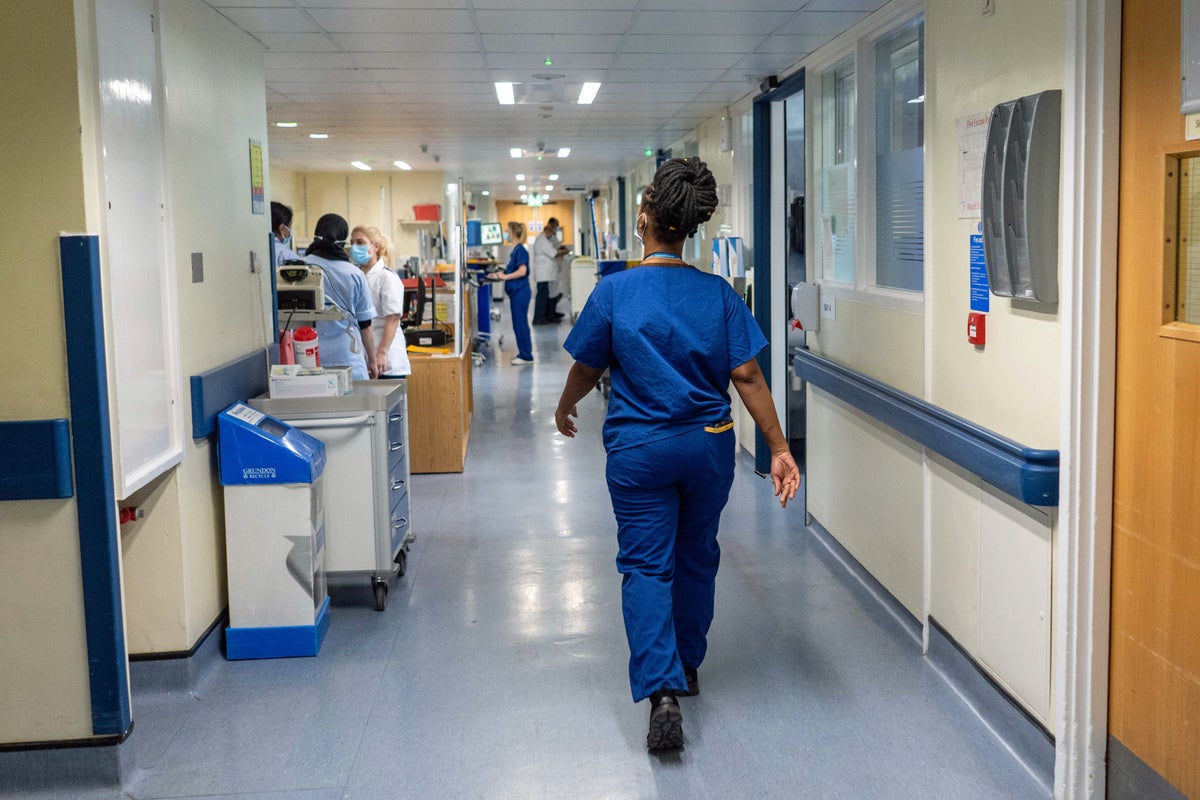
NHS patients are more likely to die or face long hospital stays if not enough nurses are on the wards, according to new research.
Experts said there was a clear link between nurse understaffing and patient deaths, adding that registered nurses should not be substituted with less qualified staff.
For the study, published in the journal BMJ Quality and Safety, a team looked at 185 adult units in four hospital trusts in England over a five-year period.
They found that employing too few permanent nurses on hospital wards was linked to longer inpatient stays, readmissions to hospital, patient deaths within 30 days of admission, and cost more money overall.
Calculations further suggested an estimated £4,728 saving for each year of healthy life gained per patient when there was increased registered nurse staffing, but not if temporary agency staff were used to plug the gaps.
The study included data from electronic health records and staffing rotas from 2015 to 2020, covering 626,313 patients in 185 different acute care wards.
It found that patients spent an average of eight days on the ward.
Those patients on wards understaffed by registered nurses (staffing below the ward average) were more likely to die (5% versus 4% for those with adequate nurse staffing levels), the study found.
They were also more likely to be readmitted to hospital (15% versus 14%), and to stay in hospital longer (eight days versus five days).
Similar results were found when there were not enough support workers, and patients also received fewer hours and minutes of care.
The researchers, from the University of Southampton, said that, during the study period, 31,885 patients died.
For every day a patient experienced registered nurse understaffing during the first five days of their stay, the risks of death and readmission within 30 days increased by 8% and 1%, respectively.
When all five days after admission were understaffed, length of stay increased by 69%.
The researchers said: “This study indicates the importance of prioritising investment in registered nurses employed on wards over nursing support worker staff, as well as showing there are no shortcuts to employing enough registered nurses as using temporary staff is more costly and less effective.”
They added: “Rectifying understaffing on inpatient wards is crucial to reduce length of stay, readmissions and deaths.”
Lynn Woolsey, the Royal College of Nursing’s chief nursing officer, said: “This report is yet more evidence of the clear link between nurse shortages and higher patient mortality.
“As the highly skilled, 24/7 presence in hospitals, nursing staff should be a priority for investment but the reality is we are undervalued and short of tens of thousands.
“Ministers need to recognise that investment in nursing more than pays for itself, improving patient safety and the health of the population.
“As student recruitment collapses and the numbers quitting nursing rises, new funding to boost recruitment and retention couldn’t be more urgent.
“This must include a fair pay award this year that nursing staff can get behind.
“Any further delay will only deepen the workforce crisis and harm patient care.”
A spokesperson for NHS England said: “Safe staffing remains a priority for the NHS, and while record numbers of nurses and midwives are now working in the NHS thanks to improved retention and significantly fewer vacancies, we know there is far more work to do.
“Every NHS trust should ensure suitable nursing and midwifery expertise is in place to deliver timely, high quality, safe and personalised care which meets their patients’ needs.”
A Department of Health and Social Care spokesperson said: “This government inherited a broken NHS with an overworked, demoralised workforce and this report highlights the consequences this has for both patients and staff.
“We hugely value NHS staff, which is why we gave them an above inflation pay rise and announced a support package to improve working lives, including easier access to flexible working.
“Our refreshed workforce plan will ensure we have the right staff in the right place and through our Plan for Change, we will turn around our health service to cut hospital waiting lists and improve conditions for staff across the country.”
Parties clash over Trump and protest votes in local elections debate
Five UK attractions shortlisted for Museum Of The Year Award and £120,000 prize
UK has hottest day of the year and could reach 30C at earliest point on record
Wedding kiss restrictions branded ‘bizarre’ by humanist leader at inquiry
Call for exercise to be prescribed alongside cancer care
William and Kate release romantic image as they enjoy anniversary on Mull







